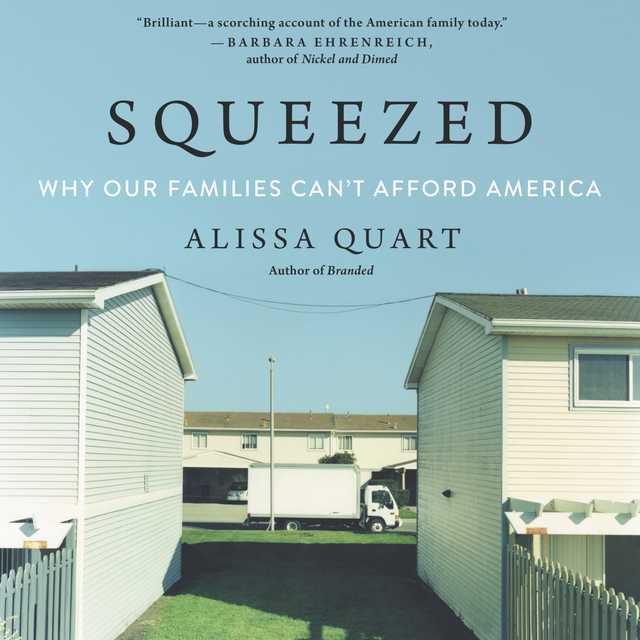Squeezed Audiobook Summary
“Brilliant–a keen, elegantly written, and scorching account of the American family today. Through vivid stories, sharp analysis and wit, Quart anatomizes the middle class’s fall while also offering solutions and hope.”
— Barbara Ehrenreich, author of Nickel and Dimed
Families today are squeezed on every side–from high childcare costs and harsh employment policies to workplaces without paid family leave or even dependable and regular working hours. Many realize that attaining the standard of living their parents managed has become impossible.
Alissa Quart, executive editor of the Economic Hardship Reporting Project, examines the lives of many middle-class Americans who can now barely afford to raise children. Through gripping firsthand storytelling, Quart shows how our country has failed its families. Her subjects–from professors to lawyers to caregivers to nurses–have been wrung out by a system that doesn’t support them, and enriches only a tiny elite.
Interlacing her own experience with close-up reporting on families that are just getting by, Quart reveals parenthood itself to be financially overwhelming, except for the wealthiest. She offers real solutions to these problems, including outlining necessary policy shifts, as well as detailing the DIY tactics some families are already putting into motion, and argues for the cultural reevaluation of parenthood and caregiving.
Written in the spirit of Barbara Ehrenreich and Jennifer Senior, Squeezed is an eye-opening audiobook. Powerfully argued, deeply reported, and ultimately hopeful, it casts a bright, clarifying light on families struggling to thrive in an economy that holds too few options. It will make listeners think differently about their lives and those of their neighbors.
Other Top Audiobooks
Squeezed Audiobook Narrator
Carly Robins is the narrator of Squeezed audiobook that was written by Alissa Quart
Alissa Quart is the author of four previous books of nonfiction, including Squeezed: Why Our Families Can’t Afford America and Branded: The Buying and Selling of Teenagers, and two books of poetry, most recently Thoughts and Prayers. She is the executive director of the Economic Hardship Reporting Project and has written for many publications, including the Washington Post, the New York Times, and Time. Her honors include an Emmy Award, an SPJ Award, and Nieman Fellowship. She lives with her family in Brooklyn.
About the Author(s) of Squeezed
Alissa Quart is the author of Squeezed
More From the Same
- Author : Alissa Quart
- Bootstrapped
- Publisher : HarperAudio
- Abraham
- American Gods [TV Tie-In]
- Dead Ringer
- House of Sand and Fog
- Prey
Squeezed Full Details
| Narrator | Carly Robins |
| Length | 8 hours 52 minutes |
| Author | Alissa Quart |
| Category | |
| Publisher | HarperAudio |
| Release date | June 26, 2018 |
| ISBN | 9780062847904 |
Subjects
The publisher of the Squeezed is HarperAudio. includes the following subjects: The BISAC Subject Code is Economic Policy, Political Science, Public Policy
Additional info
The publisher of the Squeezed is HarperAudio. The imprint is HarperAudio. It is supplied by HarperAudio. The ISBN-13 is 9780062847904.
Global Availability
This book is only available in the United States.
Goodreads Reviews
The Geeky Bibliophile
June 26, 2018
Rating: 3.5 starsI’ve read several books that focus on the struggles faced by people living in poverty (such as Matthew Desmond’s Evicted: Poverty and Profit in the American City). I had not, however, read anything focused on the struggles of those in the middle class, so when I saw this book, I was eager to read it.In Squeezed, Quart shares the difficulties faced by families, from the lower middle-class all the way up to the upper middle-class. Whether they are highly educated or not, each of them are drowning in debt, in part because of stagnate wages and the ever-increasing cost of living. In addition to the personal stories of struggle, Quart examines the factors that contribute to economic hardship.Some parts of the book are quite cerebral. Although I hate to admit it, I was often bored out of my mind as I trudged through these portions. I was far more interested in the personal stories. I appreciated the value of the other information, even though I found it a bit dull.Despite slightly mixed feelings, I’m glad I read this book.I received an advance reading copy of this book courtesy of Ecco via Edelweiss.
Caren
July 06, 2018
A primary focus of this book seemed to me to be how very difficult and expensive it has become to have and raise kids in the USA today. She did talk about people who have lost jobs in midlife and their struggles to find another job; about the gig economy; about the rising cost of housing and education; and about automation. But she always circled back to the costs associated with having children and her own induction into the ranks of squeezed parents. She notes that care work is routinely devalued (and care work is very often done by women). She also says that human biology is denied in corporate America when pregnancy and aging are seen only as deterrents to being the perfect employee. Her main admonishment to the reader is not to lay blame, reminding that often problems are caused by the system, not any personal lack.**I just came across this news story which dovetails with this author's findings...https://www.nytimes.com/2018/07/05/up...
Carrie
March 05, 2019
This book will piss you off. The American middle class is struggling to keep a sustainable lifestyle, but the outlook is pretty bleak unless politics change dramatically. Here's why:- Out of control housing costs in desirable cities because of wealthy people and Airbnb- Daycare and healthcare costs- Daycare becoming ever more necessary for working families- Unpredictable work schedules (see daycare above)- Universities not giving decent pay/hours/benefits to adjunct professors- Automation of tasks in the fields of journalism, nursing, pharmacy, law and driving(!). Seriously, fuck robots. By 2021, automation will take away 6% of American jobs. - People wasting their time and money trying to pursue dream jobs and/or second act careers, especially by spending money on training at learning institutions that can't get them employed- University tuitions rising for no good reason and not providing a path to employment, but only massive, crushing debt for years- For-profit bullshit universities with no credentials (looking at you, Trump University and ITT)- Gig economy. Employers like Uber getting out of paying decent wages or benefits by calling employees independent contractors. Since 2008, one out of three workers is a freelancer!- Public schools not being funded enough to provide copy paper or subsitute teachers, pressing PTAs to fund some things we used to consider part of the public school experience- High cost of having children and difficulty of mothers working after having them- The wage gap getting bigger and bigger. "Between 1979 and 2007, earnings for the most privileged soared nearly ten times as fast as those for the bottom 90 percent."- Union enrollment is down to 1920s numbers- Deregulation and globalization- Since the financial crisis in 2008, newspapers started tightening their belts to the tune of 40% of workers in journalism being laid off (Hi, I'm Carrie and I lost my job at The Washington Post in 2017).- "1 percent TV" involving wildly wealthy main characters is normal TV, which makes people think being rich is normal.- Regular people are presenting themselves as if they were 1 percenters online, for example, by photographing high-end places more. *I disagree, however, that homemade apple crumb bar photos count as a 1 percenter sort of thing.*- Household incomes were 8% LOWER in 2014 than in 1999!- We are expected to lose 7.1 million jobs from 2016 to 2020; 2/3 of them in office/admin work (like mine). The book provides plenty of facts and personal accounts, some of which she has followed for years. My only criticisms are that she a) tells us how to feel, b) tells us too much about herself and c) doesn't seem concerned with the poor, only those who are falling into poverty from an advantaged background.
Jennifer
January 31, 2019
Alissa Quart's book is interesting (in a generally-alarmed-for-society kind of way) as it looks at the ways that current trends are undercutting the middle class. She focuses particularly on housing, child care, and job trends, highlighting areas that are a struggle across a wide array of social groups. If her book has a weakness, it's that she keeps her eye fixed on urban and suburban areas (not surprisingly, since that's where most of the people/jobs/houses are). It just would have been good to see a few looks at "flyover country," which also has issues (and women and minorities who are struggling).
Artemis
October 22, 2018
The research in this book is dense, and for that it is a much-needed book. Quart's research is unfortunately less than groundbreaking however, and doesn't go far enough in exploring the ramifications of her findings. While the opening chapters pointed to an overarching sense that our financial failings are not our fault - they are symptomatic of a crumbling system - the end offered nothing revolutionary. I mostly gleaned from her research to help support my own, as her most shocking findings were peppered between endless chapters about how much I should feel bad for the middle class. For instance, this morsel of information was nestled in tiresome discussion about watching 1% TV: “The average top 1 percent family now earns forty times what the average family in the bottom 90 percent earns. Household incomes nationwide in 2014 were 8 percent lower than in 1999, according to Pew Research.”The fact is, I'm living in a world where nobody I know can afford TV, much less worry about what they're watching on TV. Quart admits that most, if not all, of her friends are as middle-class as herself, and the lack of diversity in her perspective shows. I had higher expectations, but Quart was still an interesting read and I'll be sure to read more from her in the future.
Marks54
July 17, 2018
This is a book by a journalist of economic distress about the experiences of people trying to live in the traditional “middle class”. These people find that in critical parts of their lives, costs have escalated while middle class jobs have increasingly gone away to outsourcing, globalization, and automation while wages have been flat or declining since the 1980s. The result is considerable and distress as people cannot raise families into the life situations they knew and accepted as children and young adults. This leads to the feeling of being “squeezed”.When I started reading this, my reaction was ambivalent. On the one hand, each chapter discusses some aspect of how the author’s subjects have felt distress, along with background information and some data to provide a broader picture of the problems. These accounts ring true and these problems have been written about by others.Having said this, I was also initially annoyed by the author’s habit of wearing her heart on her sleeve in considering the plight of these people. Norms got mixed up with descriptions, “is” frequently mixed with “ought”, and subjective advocacy seemed to be embraced. I grew to appreciate and like this perspective, however. I have known lots of people in such situations and many of these have faced truly tragic circumstances. It is difficult not to feel sympathetic and wish that you could find some way to help these people. The author is also right on target that class mobility in America can go down as well as up and that class related anxiety is associated with a whole host of social, medical, and political issues in America today, not to mention the economic ones. In this wonderful book, Ms. Quart is arguing that a mjor part of the problem under consideration is that anxiety that people feel about class and their sense of being squeezed out of the class in which they were raised and invested time in education and training.All of the chapters work fairly well, although one of my favorites was the one later in the book about the pitfalls of the “second chance industry” that preys on people who need to find new careers or keep working past their typical retirement ages. There are lots of books around covering these topics and the numbere seems to have increased since 2008 and again since 2016. This is one of the better ones and I will now start following her work with the Guardian.
Catherine
November 30, 2018
I almost didn't read this book because of a couple poor reviews, but I'm very glad I did. Instead of focusing on the desperately poor, as so many of these types of books do, this one looks solidly at the middle class, and in particular at educated people with decent jobs (such as nurses, teachers, policemen, college professors and even lawyers) who grew up middle class but now are struggling to remain there, even with full time jobs paying relatively well. This problem is especially true in places where the cost of living has skyrocketed and the cost of a basic house is out of reach for most people who did not buy into the market 20 years ago (California and New York are heavily featured). There is also a lot of discussion about the high cost of childcare and the difficulty of balancing a two earner family with caring for young kids. This book spoke to me because this is exactly the experience of many of my friends, and likely would have been true for me, if I had not left the US and lived and worked overseas for most of the past 20 years. I think one of the best insights was the idea that when you grow up middle class, you have an expectation of a certain type of life (camps for your kids, eating out sometimes, an annual vacation), and it is very difficult to realize that the kind of childhood you had, is not one you can provide for your kids. No one in this book is starving or homeless, and that was actually the criticism I had read...the book may come off as whiny to people in much more dire circumstances. However, I feel like books about the working poor are widely available, and this one seemed to fill a niche that has not been so well explored.
Bryan
July 13, 2018
It should be no secret that the middle class has been shrinking for some time, and that income disparity has reached levels not seen in the US since just before the Great Depression. Quart does a very good job of laying out the problems facing the middle class today, with many personal stories to bolster the data. The middle class is being squeezed for a variety of reasons, including the rising cost of living, a shortage of affordable daycare options for working parents, the shrinking of traditional middle class professions such as college teaching and law, automation, etc. Quart offers some options for alleviating some of the problems, but by and large the problem is so systemic and politically intractable, there are no easy solutions on the horizon, and current political situation just makes it worse. Overall a somewhat depressing book with some glimmers of hope here and there. I wish more solutions were available.
Marc
May 13, 2021
Alissa Quart's "Squeezed" provides readers with a comprehensive, in-depth view of the decline of America's middle class in our winner-take-all economy. Quart makes her points by telling the stories of a wide array of interesting people, ranging from teachers moonlighting as Uber drivers to super-educated men and women struggling just to get by. I've read lots of good books about the decline of the American Dream because of the increased concentration of wealth and power among a few. However, few, if any, tell that tale as well as "Squeezed."
Jen
August 25, 2018
Great book looking at the struggles of the middle class. The observations that we don’t care about care- day care, maternity leave, health care, adjunct professor, etc- was spot on. The Uber teacher chapter and 24 hour day cares were really interesting. It just corroborated my fear that the only American value that is promoted currently is making money- no matter the impact on our workers (or environment). Great reporting!
Donnell
July 15, 2018
Really admire what the author is doing here and she offers good info. A bit focused on the squeezing though that occurs when a child is brought into a life. This adds to the burdens of those less wealthy, of course. But there is no noting that even the class of people on which she focuses can feel this problem less acutely if they happen to have family, such as a grand parent, step in--as many of these people do.The thing is, the squeezed problem is much bigger than childcare--and she gets to this with the teachers driving Uber, though here again teachers do have weeks off at summer that others earning at their salary do not have.I am, however, one of those who believe teachers need those summers!! Teaching is a draining job and also requires continual study and educating, as well as lesson plan preparing, etc. Sadly, the problem she describes is one I have watched progress since I left a legal career back in the early 1990's for a more "livable" life and I have only watched it become worse.
Emily
August 05, 2018
The content was great and really well-researched. There were times when the author got a bit whiny and victimized though. While I learned a lot about many of the systemic problems with the economy and reinforced what I do know, sometimes she would slip out of journalist and into the role of victim.
Sara
December 28, 2019
Although I strongly disagree with some of the conclusions offered in this book (such as economic anxiety/income inequality being the main reason Trump was elected), it covered real issues and was overall informative.
Olivia
August 02, 2019
I really enjoyed this book. She made some good points and I didn’t find it to be too repetitive.
Most Popular Audiobooks
Frequently asked questions
Listening to audiobooks not only easy, it is also very convenient. You can listen to audiobooks on almost every device. From your laptop to your smart phone or even a smart speaker like Apple HomePod or even Alexa. Here’s how you can get started listening to audiobooks.
- 1. Download your favorite audiobook app such as Speechify.
- 2. Sign up for an account.
- 3. Browse the library for the best audiobooks and select the first one for free
- 4. Download the audiobook file to your device
- 5. Open the Speechify audiobook app and select the audiobook you want to listen to.
- 6. Adjust the playback speed and other settings to your preference.
- 7. Press play and enjoy!
While you can listen to the bestsellers on almost any device, and preferences may vary, generally smart phones are offer the most convenience factor. You could be working out, grocery shopping, or even watching your dog in the dog park on a Saturday morning.
However, most audiobook apps work across multiple devices so you can pick up that riveting new Stephen King book you started at the dog park, back on your laptop when you get back home.
Speechify is one of the best apps for audiobooks. The pricing structure is the most competitive in the market and the app is easy to use. It features the best sellers and award winning authors. Listen to your favorite books or discover new ones and listen to real voice actors read to you. Getting started is easy, the first book is free.
Research showcasing the brain health benefits of reading on a regular basis is wide-ranging and undeniable. However, research comparing the benefits of reading vs listening is much more sparse. According to professor of psychology and author Dr. Kristen Willeumier, though, there is good reason to believe that the reading experience provided by audiobooks offers many of the same brain benefits as reading a physical book.
Audiobooks are recordings of books that are read aloud by a professional voice actor. The recordings are typically available for purchase and download in digital formats such as MP3, WMA, or AAC. They can also be streamed from online services like Speechify, Audible, AppleBooks, or Spotify.
You simply download the app onto your smart phone, create your account, and in Speechify, you can choose your first book, from our vast library of best-sellers and classics, to read for free.
Audiobooks, like real books can add up over time. Here’s where you can listen to audiobooks for free. Speechify let’s you read your first best seller for free. Apart from that, we have a vast selection of free audiobooks that you can enjoy. Get the same rich experience no matter if the book was free or not.
It depends. Yes, there are free audiobooks and paid audiobooks. Speechify offers a blend of both!
It varies. The easiest way depends on a few things. The app and service you use, which device, and platform. Speechify is the easiest way to listen to audiobooks. Downloading the app is quick. It is not a large app and does not eat up space on your iPhone or Android device.
Listening to audiobooks on your smart phone, with Speechify, is the easiest way to listen to audiobooks.






























